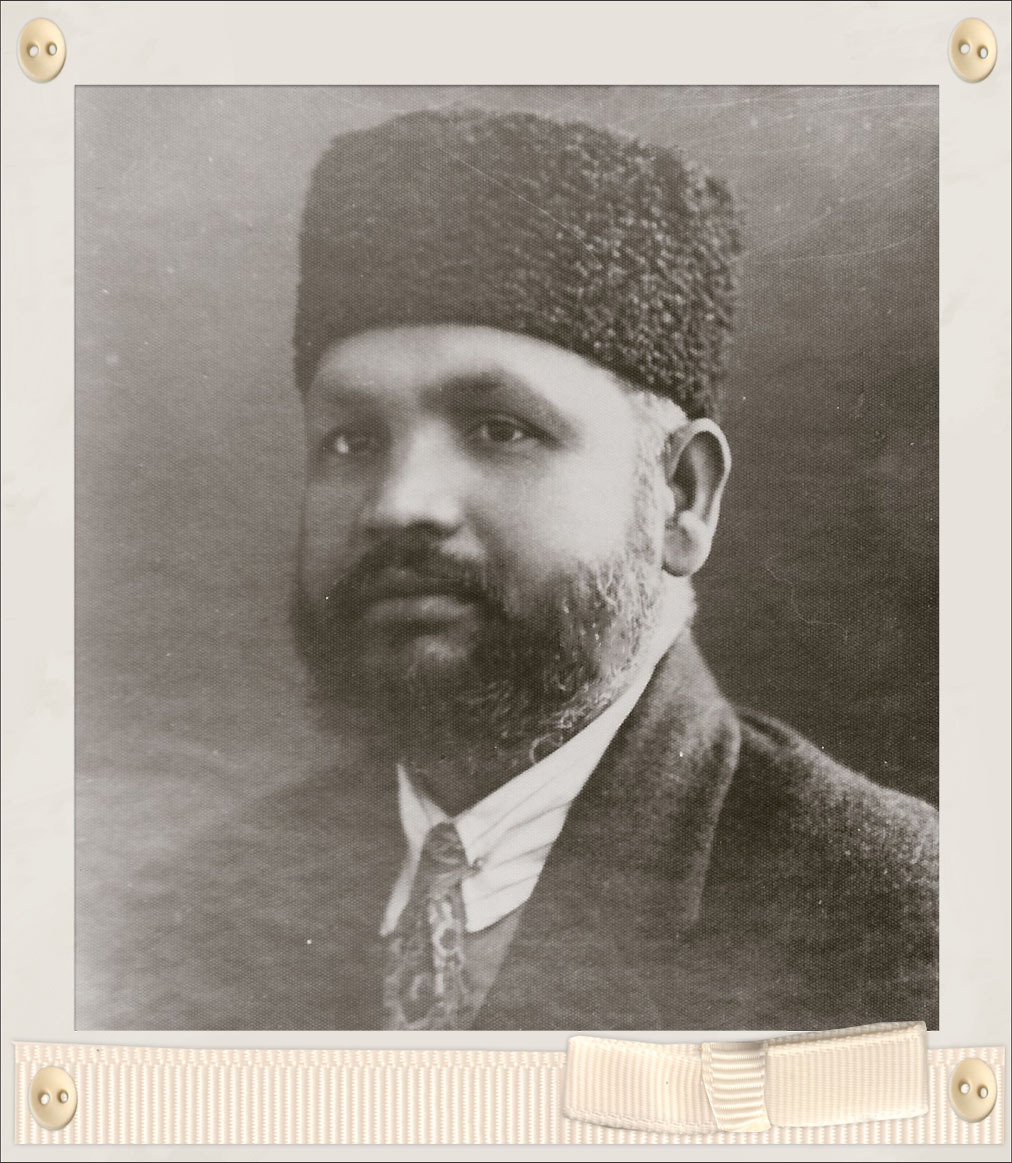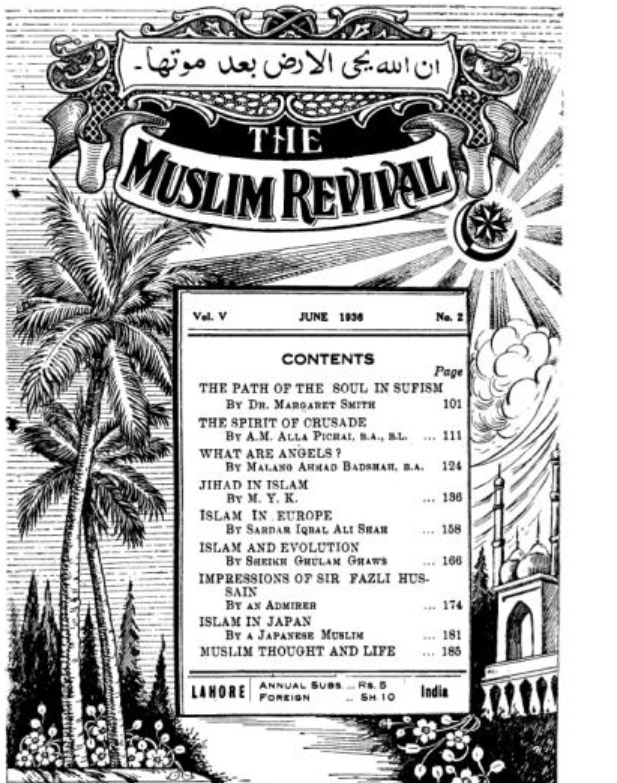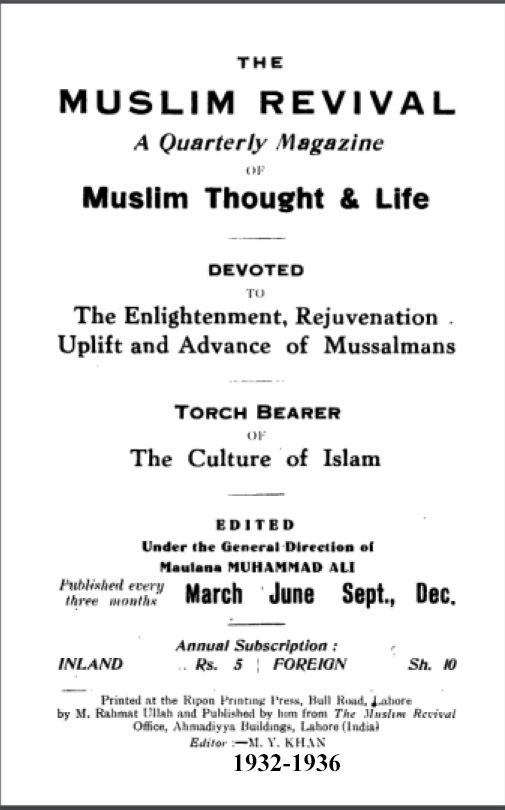Salim
 An editor is after all a human being. He has his share of the sorrows and sufferings that are the common lot of man. The present writer had to taste of that bitter cup in the death of his son Salim.He asks the reader´s indulgence to share this bitter experience with him.
An editor is after all a human being. He has his share of the sorrows and sufferings that are the common lot of man. The present writer had to taste of that bitter cup in the death of his son Salim.He asks the reader´s indulgence to share this bitter experience with him.
Salim was more than a son to me. He was a personal friend, a private Secretary, an A.D.C., all in one to me. He had just passed the 16th year but I never had had the occasion to upbraid him or accost him with a harsh word. This was all due to him. He was all care and sympathy for me. The slightest shade of feeling on my face had a repercussion on his mind. And he lost no time in attuning his mind accordingly. In Salim I have lost my duplicate.It was Salim who shared with me the burden of my daily life. It was he who would see all sorts of little house-hold needs. It was he who would keep the mess account, do shopping for the household, keep by the bed-side of an ailing member of the family. And if the cook happened to be away he wouldn´t mind rushing to the kitchen, lighting fire and preparing a little breakfast for the family. On our occasional shooting excursions, it was Salim who was the mainstay of our family party. With the pouch slung across his shoulders he would paddle untiringly mile after mile, carrying at the same time his younger brother on the back seat.
And for a sure steady shot we invariably looked up to him. To his bed-ridden mother he was an angel of mercy. It was he who would bodily lift her up and carry her from place to place. On our long and tiresome trips to Kashmir, it was Salim who looked to packing and unpacking and all other sundry things incidental to such trips. On our outings and picnics it was Salim who, by his ever-ready services, would make the family feel comfortable and at home. If the tent pegs had gone loose, it was Salim who would be seen, hammer in hand, driving them deeper into the ground. If a special dish was desired by the family it was Salim who would be seen supervising the cooking, even lending a hand himself and then with the light of inward satisfaction that is born of service to others, playing on his face, he would begin serving the same. Such was Salim. In him I have lost my right hand.
Yet so it was to be. That was the decree of some inscrutable Providence. With the robust physique that he enjoyed nobody could imagine that the parting of ways was really at hand. When however his temperature shot up to 105 and 106 and persisted at that level for days together, he had a premonition. “Is it sin Abbaji,” he asked one day “to commit suicide?”
He had a feeling too hovering on me all along. Over a month or so back I had had a vision. I saw myself dressed in a shabby dusty pair of clothes with the sleeve at the left-hand shoulder torn. Coming events seemed to cast their shadows before and with every day that the illness prolonged, my heart sank lower within me. It was an unusual attack, I felt. I refused to believe however that God would really rob me of this great friend, companion and comforter.
He could not be so heartless, I persuaded myself and went on hoping against hope. No stone was left unturned, neither medical help, nor supplication to Heaven, to avert the impending calamity. The best of medical help, however, that could be secured failed to give it a turn for the better. The supplications of the bleeding heart of a father and other relations also that went up to Heaven seemed to fall flat. Events seemed grimly to march towards the tragic end, as if driven by the inexorable hand of Fate till the culmination was reached at 7.35 P.M. on Sunday, December 22, when the agony of Salim was transformed into eternal calm. He breathed his last in the very lap of his father, aunt and sister who were tending him at the moment.
Salim is now no more. Salim has become a mere name now. Like the meteor that flits across the firmament and illumines the dark space above for a moment and then disappears for ever and ever more – such was the short career of our dear Salim in our midst. There is a gap in our family life that is so galling. At every step there is some little thing that reminds us of this grim reality. The little fig plant in the compound that Salim had planted is wondering where the hand is gone that used with such affection to tend it. The mare that would prick her ears to Salim´s affectionate calls is the picture of gloom. Do animals sense what happens to their human associates?
At every little turn of our domestic life there is something or other which may be heard crying with inarticulate tongue – “Salim! Salim! Where art thou gone?”
Yet this is the way of life. The eye may weep. The heart may bleed. But let not the head allow itself to be carried off its legs by this flood of sentiment, quite natural sentiment. After all death is the common lot of man and Salim has gone the way of the countless millions of fellowmen. The Prophet was the dearest of mankind of God. But when his profound wisdom chose to call back his only son, Ibrahim, The Prophet´s supplications and anguish could not avert the decree. After all, may it not be that death is not the dreadful thing we imagine it to be? May be, death is deliverance from the pain and sorrow of life that are the lot of all men. May be, death is the gateway to a better and happier plane of life – a life where there is no snow, no hail, no storm. May be death is something like the setting of the star. Just at the moment when it seems to set on our horizon, it is dawning on another. Or perhaps like the boat that sets sail and disappears on the boundless main. Whereas it vanishes from the vision of those standing on the coast, there is another coast where people are gathered to hail it – to a new and a better world.
That is at any rate how the Quran tells us death is like:
وَلَا تَقُولُوا۟ لِمَن يُقْتَلُ فِى سَبِيلِ ٱللَّهِ أَمْوَٰتٌۢ بَلْ أَحْيَآءٌ وَلَـٰكِن لَّا تَشْعُرُونَ
“Do not say of those who die, in God´s path, they are dead. Nay, they are alive but ye know not.”
(Al-Baqara (The Cow) 2:154)
Whatever out little human sentiments, death is after all not the unmixed evil we imagine it to be. It is the travail of a re-birth. Every birth is accompanied by a travail and so the agony of death is but the travail of a re-birth – a re-birth in a life fuller, richer and more abundant. That it should leave near and dear ones with anguished hearts is natural enough. But let not that anguish be without a touch of envy too. The narrow and dreary pathway that every one of us must cross in order to be admitted into the life of eternal bliss and happiness that is in store or the pure souls has already been crossed by the soul that is gone. We have yet to go through it. Salim has passed the test. We mourn his death have yet to pass that grim test. He is like the champion who has jumped over the hurdle. We have yet to take that painful jump.
Let the heart weep by all means if it may, let not our intellect allow itself to be blinded to this side of the picture. When all is said and done, the soul that is gone is decidedly the gainer. It breaks through the shackles of this mundane life – a life bristling with sorrows and sufferings at every step, a life which made the great Buddha turn his back on royal sceptre, lovely bride and a lovelier child. Death is after all a deliverance from such a life, an emergence on a certainly better plane of life. That is the significance of the dreadful leap that Salim has taken – a leap in the dark apparently but a leap to brighter world, a world where there is neither hail nor storm nor snow.
A week or so before Salim was born, I had a vision. The coming child was to be a boy, I saw and his name was to be وجہ رحمۃ i.e. “The cause of mercy”. All along we reminded Salim of that name. We thought he would grow up to be somebody in the world and thereby bring comfort and happiness to us. When however there came this bolt from the blue I was confounded. “How is it”, I said to myself, and “that Salim had been called Wejh-i-Rahmat, cause of mercy?” Was it all in vain? “No it was not,” a friend promptly enlightened me, “Have you forgotten the Qur’anic verse”:
وَلَنَبْلُوَنَّكُم بِشَىْءٍ مِّنَ ٱلْخَوْفِ وَٱلْجُوعِ وَنَقْصٍ مِّنَ ٱلْأَمْوَٰلِ وَٱلْأَنفُسِ وَٱلثَّمَرَٰتِ وَبَشِّرِ ٱلصَّـٰبِرِينَ
“And We shall try you with something of fear, of hunger, of loss of wealth, of life and fruits. Then give good news to the patient ones who when a calamity befalls them say – Surely for God we are and unto God we go”.
(Al-Baqara (The Cow) 2:155)
أُو۟لَـٰٓئِكَ عَلَيْهِمْ صَلَوَٰتٌ مِّن رَّبِّهِمْ وَرَحْمَةٌ وَأُو۟لَـٰٓئِكَ هُمُ ٱلْمُهْتَدُونَ
”These are the people on whom come blessings from God and His رحمۃ mercy. These ae the people that are rightly guided”
(Al-Baqara (The Cow) 2:157)
It was in this sense that Salim was to be a “cause of mercy” to us. The very name contained the hint as to this coming episode of his death in the full bloom of youth. It was a consolation from God, as it were, conveyed even when he was not yet born that his death when it comes, must not be taken as a calamity.
It must be taken as a cause of God´s mercy. Humanly speaking there may not be much of mercy in death. But how limited, how little, how false our visions so often are! God alone sees the whole of the picture. He knows best. He does best. It should be enough for us that He has called Salim´s death as the “cause of mercy”. For, are not there more things in heaven and on the earth than we poor mortals may dream of?
This, by the way, need not be dismissed as the personal affair of an editor who has abused his position to ventilate his own feelings. Salim is a symbol now. There is not household which has not laid a Salim of its own to eternal rest. These reflections should be of general application and general solace. This should also explain and excuse the omission of a couple of numbers of this paper.
(Muhammad Yakub Khan)
(Chief Editor “The Light”, Lahore, Pakistan)
(The article was published in the “The Light” 1 January 1941)
|
|
Courtesy: aaiil.org



